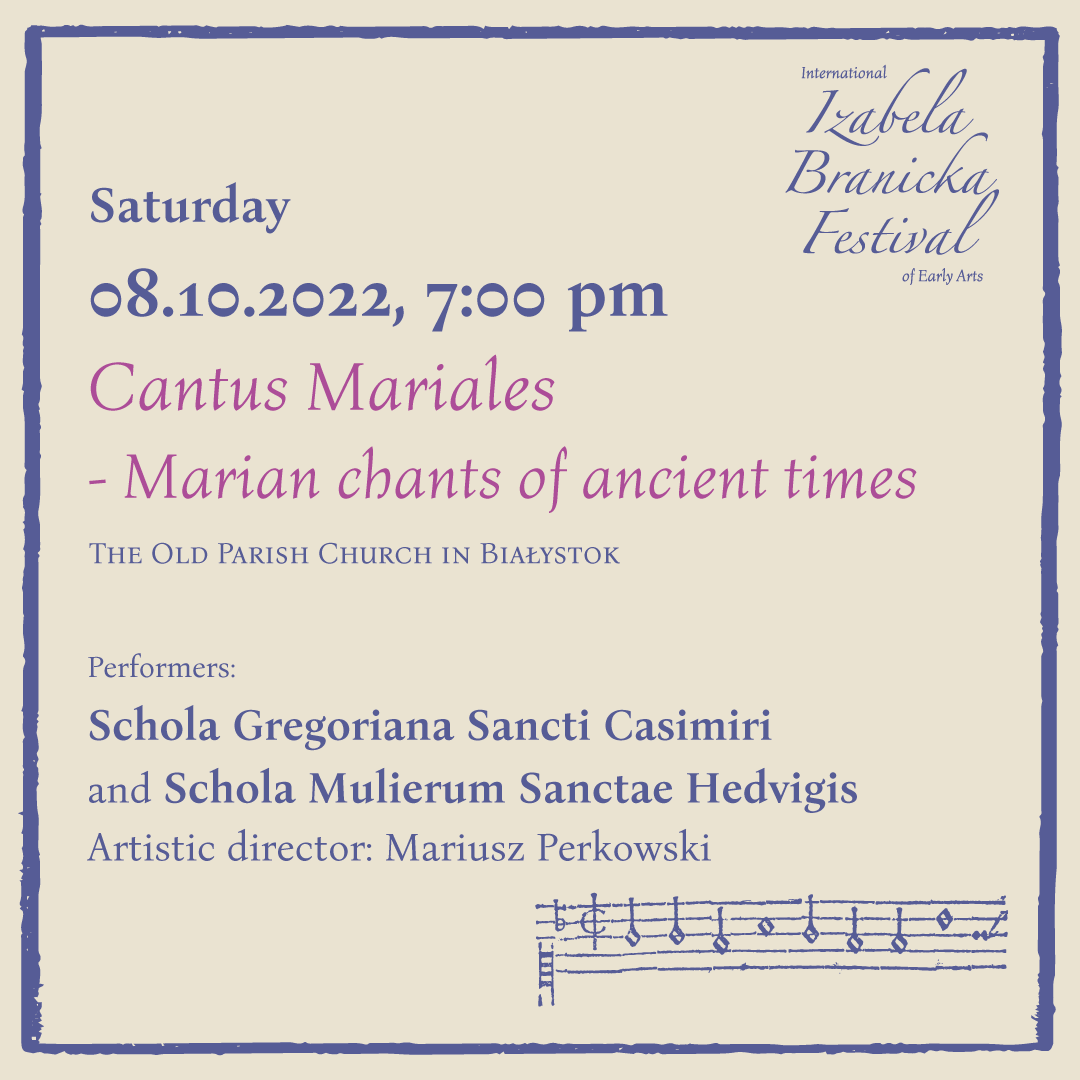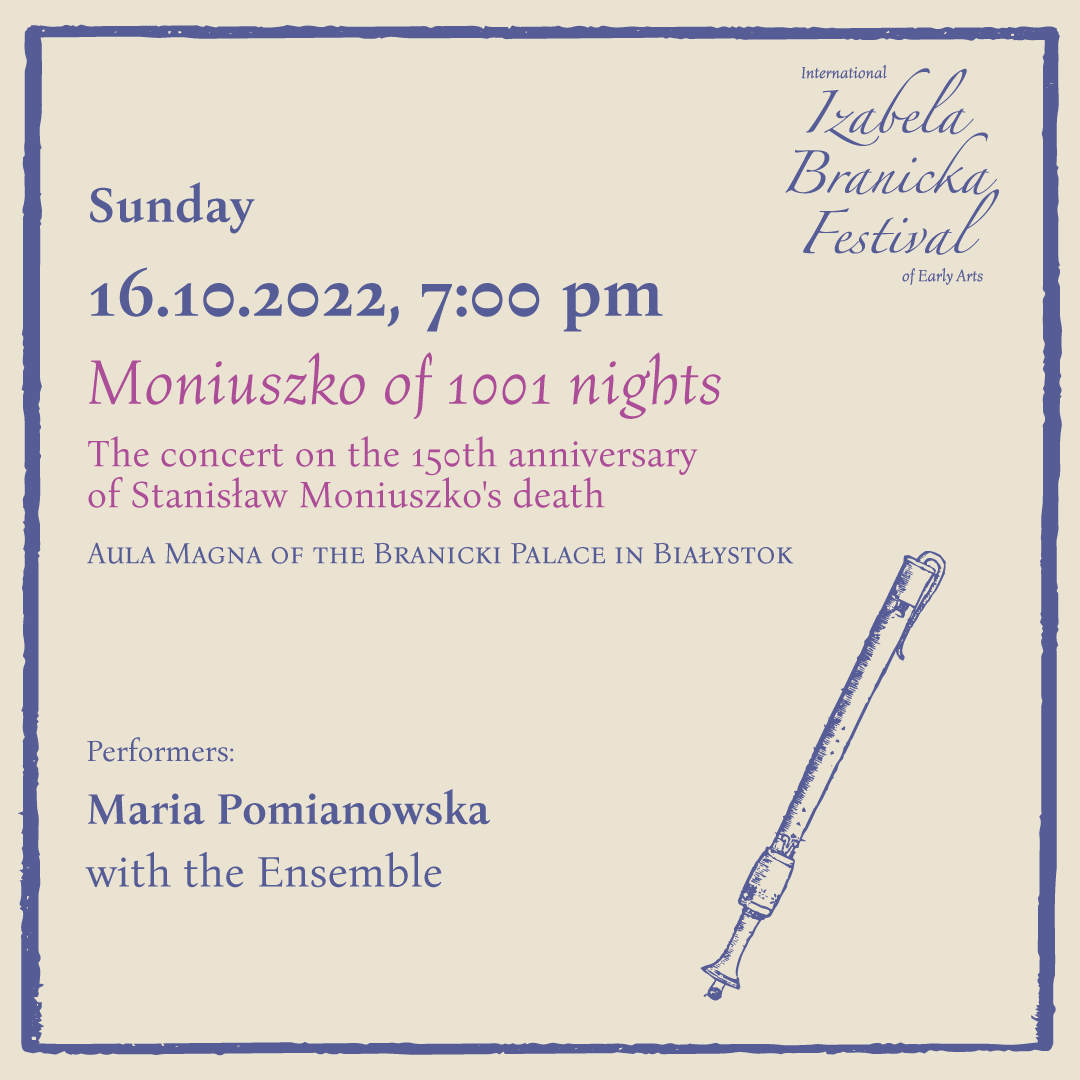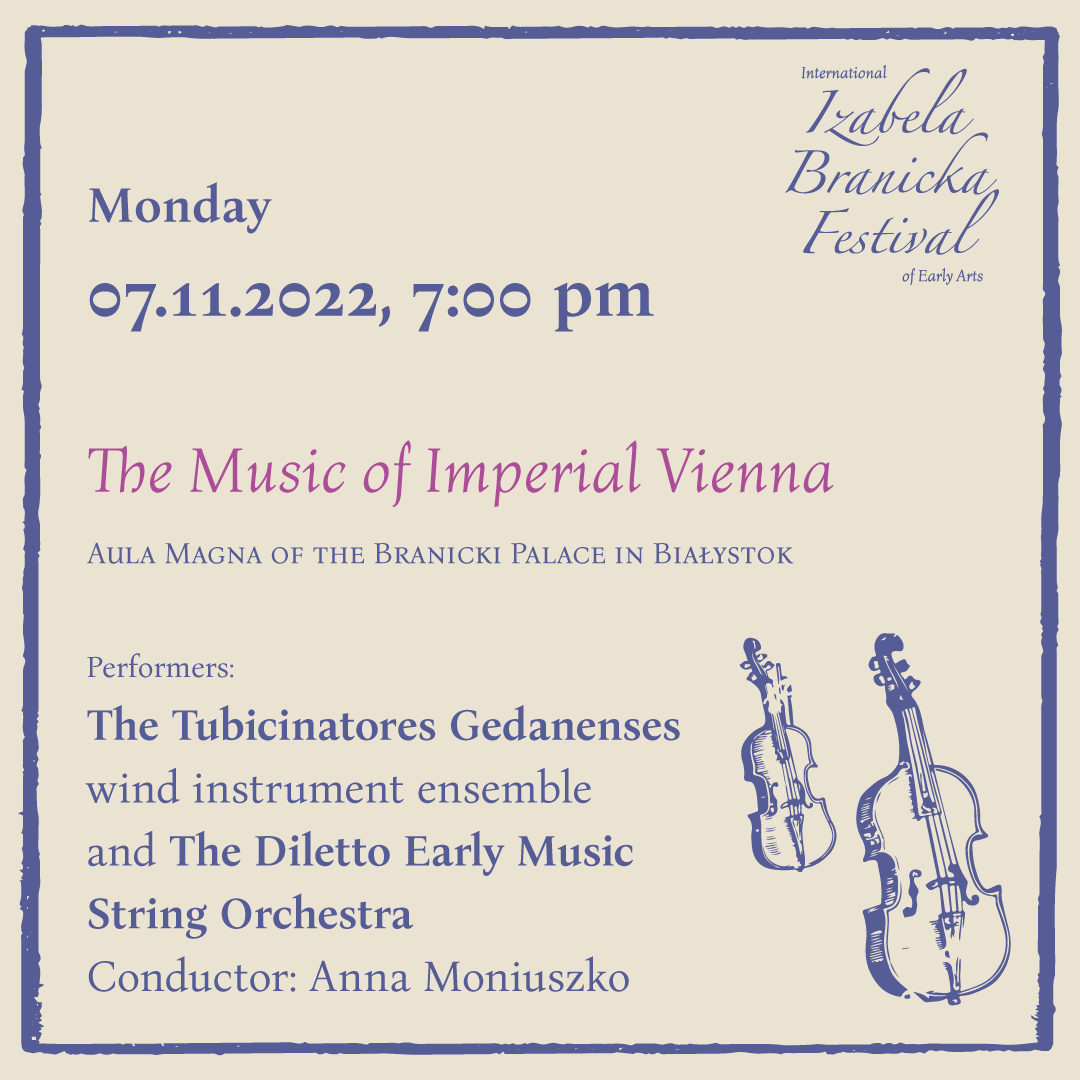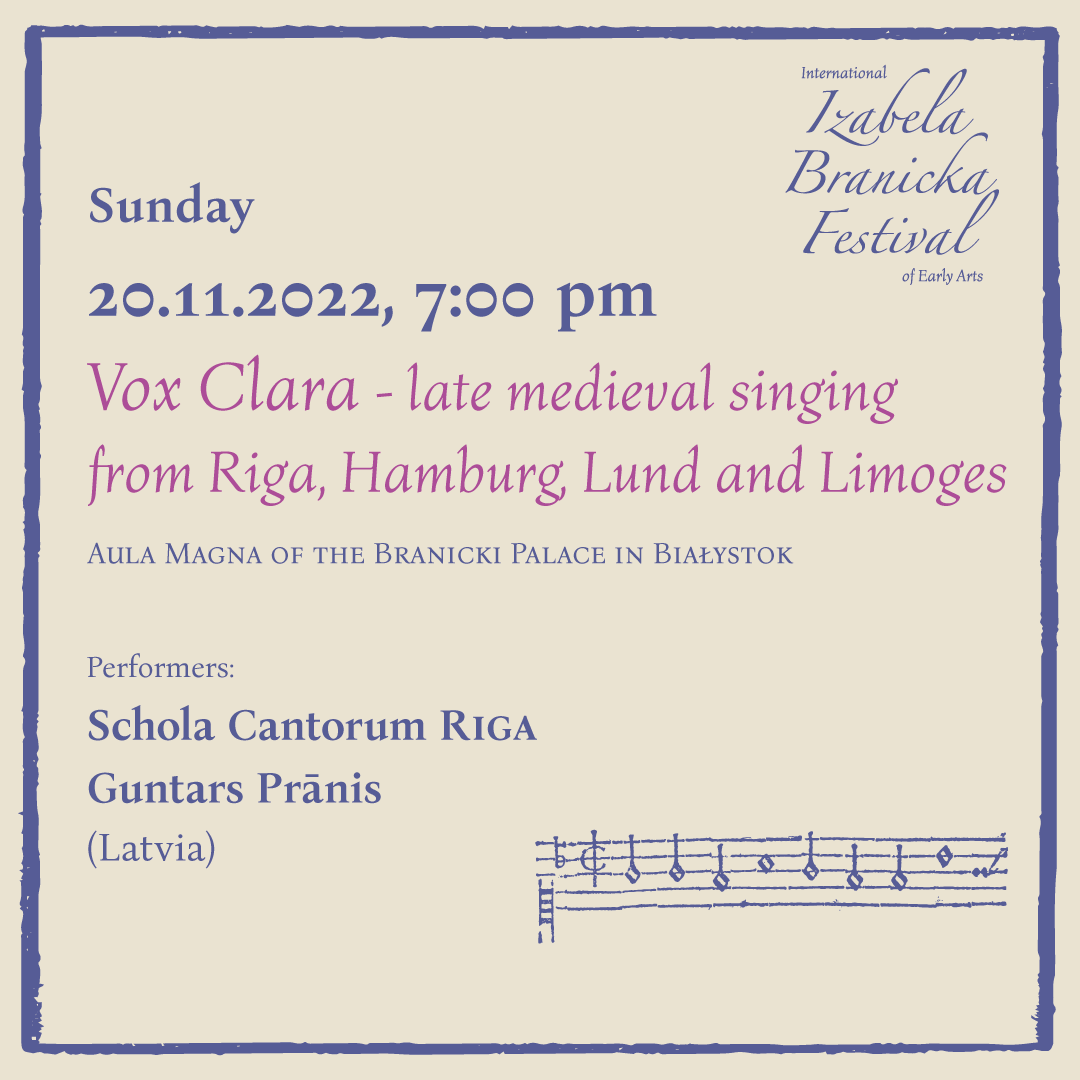8th October - 20th November 2022
Izabela Branicka International Festival of Early Arts
12th edition
The festival will begin on 8 October - the eve of the anniversary of the death of Izabela's husband - Jan Klemens Branicki - a concert by the Schola Gregoriana Sancti Casimiri and Schola Mulierum Sanctae Hedvigis ensembles presenting Marian songs of the old centuries and will end on 20 November with the performance of Schola Cantorum Riga from Latvia with the concert "Vox clara - late medieval singing from Riga, Hamburg, Lund and Limoges ". On 9 October, in the Town Hall, we will hear court music of French provenance during the concert of the Trio {oh!} "With a dedication to the Sun King" and in Aula Magna in the Branicki Palace in Białystok, 16 October, a concert commemorating the 150th anniversary of Stanisław Moniuszko’s death "Moniuszko of 1001 nights" Maria Pomianowska with the Ensemble and the premiere of the reconstructed ceremonial music of imperial Vienna from the 17th and 18th centuries - 7 November by the Tubicinatores Gedanenses Ensembles and the String Orchestra of the Diletto Early Music Ensemble conducted by Anna Moniuszko.
All events are available free of charge online.
You are welcome to come.
PROGRAMME
8 October 2022 (Saturday), 07:00 pm
Cantus Mariales - Marian chants of ancient times
The Old Parish Church in Białystok
Performers:
- SCHOLA GREGORIANA SANCTI CASIMIRI
- SCHOLA MULIERUM SANCTAE HEDVIGIS
Event description:
The "Cantus Mariales" programme is the culmination of work on popularising medieval and Renaissance Marian chants, which for many years have been performed during concerts by the Male Singing Ensemble Schola Gregoriana Sancti Casimiri under the direction of Mariusz Perkowski. The songs from many sources of European Christianitas, i.e. civilisation, built on the Christian foundation of cultural identity, will be presented during the concert. There will also be Polish works, currently forgotten and unknown to a wider audience, and a choral from post-Tridentine books published by Piotrkowczyk in the 17th century. Monodic and polyphonic singing will be performed in a historically informed manner, both a capella and with the use of ancient instruments, e.g. hurdy-gurdy, viola da mano, lute, medieval percussion and choir organ.
Male Singing Ensemble SCHOLA GREGORIANA SANCTI CASIMIRI (St. Casimir's Gregorian Schola) - founded in 2008. It includes singers interested in the performance of traditional church music, especially Gregorian chant. The artistic management of the ensemble is exercised by Mariusz Perkowski. The Schola made its debut performing at the Łapskie Te Deum Sacred Song Festival in 2008. Since then, it has participated in numerous concerts, which are an attempt at a musical reconstruction of the services of the 17th century and 18h century by performing monodic singing. In this regard, it constantly cooperates with the Diletto Early Music Ensemble. In this capacity, it has also cooperated with the Polish Orchestra of the 18th century under the direction of Paul Esswood. The Schola regularly takes part in festivals, including the "Battle of Białystok" Reconstruction and Historical Festival, the Festival of Ancient Arts - Izabela Branicka’s Name day (annually), Fr. Wacław Rabczyński 8th International Festival of Organ and Chamber Music, the 3rd edition of the Mońki International Music Evenings at St. Albert. More than once, a concert with its participation inaugurated the beginning of a given festival, which took place in the case of the Mysterium Fidei Festival (2013), the 6th edition of the Organ and Chamber Music Concerts in Ełk, the Fide et Amore Festival of Religious Creativity in Żory and the Nicholas of Koźle Festival in Kędzierzyn Koźle in 2016 and 2021. The ensemble has recorded the following recordings: "Opera Omnia by Andrzej Siewiński" for the DUX record company, where it accompanied the "Diletto" Early Music Ensemble, as well as the " Pious Songs by Franiciszek Karpiński" and "Christmas Carols of the European Christianitas", containing medieval songs related to the Christmas period.
9 October 2022 (Sunday), 07:00 pm
With a dedication to the Sun King
Museum of Podlasie City Hall in Białystok
Performers:
{oh!} trio
- Martyna Pastuszka - violin,
- Krzysztof Firlus - viola da gamba,
- Anna Firlus – harpsichord
Event description:
The concert programme will include recently discovered compositions by Louis-Joseph Marchand - valued by Louis XIV and associated with the royal orchestra. It will also be a concert heralding a three-disc album with the complete Suite de pièces by Louis-Joseph Marchand, which will be released at the beginning of next year by the French publishing house Aparté, being a world premiere of these musical works.
The {oh!} trio are the musicians associated with the {oh!} Historical Orchestra, who also successfully pursue solo careers. Three outstanding chamber musicians, and academic lecturers, specialising in the stylish performance of the music of the old ages, have been playing as a trio for 4 years. The visible result of this cooperation is the album entitled Portraits, which was released on the market at the beginning of October (DUX), at the beginning of the next year, a three-disc album with music by LJ Marchand (Aparte label in Paris) will be released.
16 October 2022 (Sunday), 07:00 pm
Koncert w roku 150 lecia śmierci Stanisława Moniuszko "Moniuszko z 1001 nocy"
The Aula Magna of the Branicki Palace
Performers:
- Maria Pomianowska with the Ensemble
Event description:
Nobody questions the fact that the uniqueness of Moniuszko's works is largely due to the inspiration from folk music. Customarily, however, these phenomena function in different contexts and belong to different performance traditions. The programme, created in 1995 by Maria Pomianowska, was born out of a desire to break this stereotype. It is a completely new perspective reducing folk music and Moniuszko's songs to a common denominator. In addition to works by the outstanding composer arranged and performed on original folk instruments, the project presents unique songs, oberek, kujawiak and polka from the Masovian lowlands using unusual instruments. These are songs whose echoes we hear in Moniuszko's compositions - the ones that could have been an inspiration for his work.
7 November 2022 (Monday), 07:00 pm
The Music of Imperial Vienna
Aula Magna of the Branicki Palace in Białystok
Performers:
- Tubicinatores Gedanenses
- String Orchestra of the Diletto Early Music Ensemble, director Anna Moniuszko
Event description:
The music of imperial Vienna is a unique music project dedicated to the Tubicinatores Gedanenses ensemble of historical trumpets and timpani accompanied by a baroque chamber orchestra. The music presented in the programme is based on the repertoire of the 17th and 18th century Imperial Court in Vienna. Ceremonial sonatas were performed by musicians at courts, both secular and church, to the delight and entertainment of both the aristocracy and wealthy urban patricians who organised concerts in the privacy of their homes.
Tubicinatores Gedanenses is a group of musicians who use the copies of historical instruments for playing. It consists of four trumpets and timpani, a combination that is extremely rare in contemporary concert life. In the past, it appeared quite often at the courts of rulers, during the hustle and bustle of battles or city celebrations. The assumption of the ensemble is to continue the great Gdańsk musical tradition of Turmmusik, i.e. concerts from church towers and town halls of wealthy cities (German der Turm - tower). By presenting musical compositions in their playing, Gdańsk trumpeters differed from the rest in that limited their playing only to signals in those places. This tradition was born in the 15th century and lasted until the beginning of the 20th century.
20 November 2022 (Sunday), 07:00 pm
Vox clara - late medieval singing from Riga, Hamburg, Lund and Limoges
Aula Magna of the Branicki Palace in Białystok
Performers:
- Schola Cantorum Riga (Latvia)
Event description:
The latest Vox Clara programme uses bagpipes and a hurdy-gurdy, both documented in traditional Latvian music and the national instrument kokle (a kind of Baltic box zither). Early music dialogues and instrumental improvisations are unique, creating a unique atmosphere where the past meets the present.
The Schola Cantorum Riga performs Gregorian chant and other early music repertoires. Particularly appreciated by the audience are the programmes performed together with guest artists representing various instruments: hurdy-gurdy, Bagpipes, Flute, Duduk, Organ, Marimba, percussion instruments, Acoustic guitar, Saxophone, etc.
The Schola Cantorum Riga has been regularly performing Gregorian chant and other early music compositions for over two decades, basing its interpretation on the studies of the oldest neumatic manuscripts. Over the years, it has developed into a group with a very wide and varied repertoire. Its main goal is to perform music at a high artistic and professional level, reflected in the group's numerous concerts in Latvia and abroad and in its regular recording projects. Although Schola Cantorum Riga mainly performs medieval music, it also occasionally performs compositions by contemporary composers (Rihards Dubra, Henning Sommerro, Nic Gotham, Renāte Stivriņa, etc.), which are often created specifically for the ensemble. One of the most important places of Schola Cantorum Riga is the Riga Cathedral, where countless concert projects involving early music as well as premieres of compositions by contemporary composers have been realised. The group regularly participates in early music concerts and festivals in Latvia and abroad, where it enjoys the undivided attention of audiences in Italy, Switzerland, Germany, Austria, Belgium, France, Poland, Norway, Finland, Estonia, Lithuania and other countries. In 2017, Schola Cantorum Riga was nominated for the Latvian Grand Music Award for outstanding performance.





